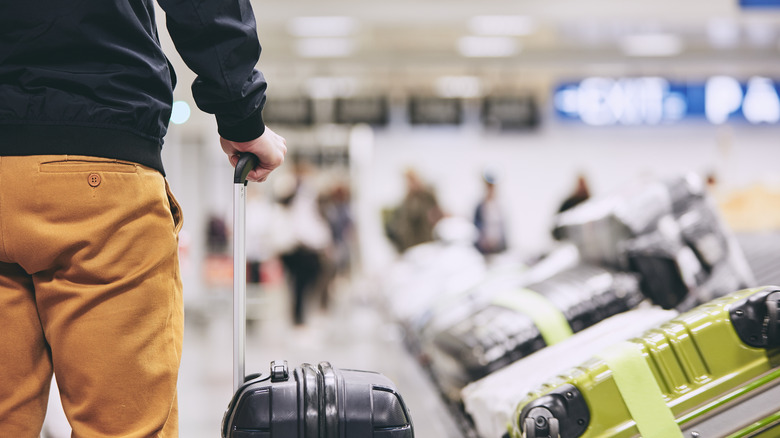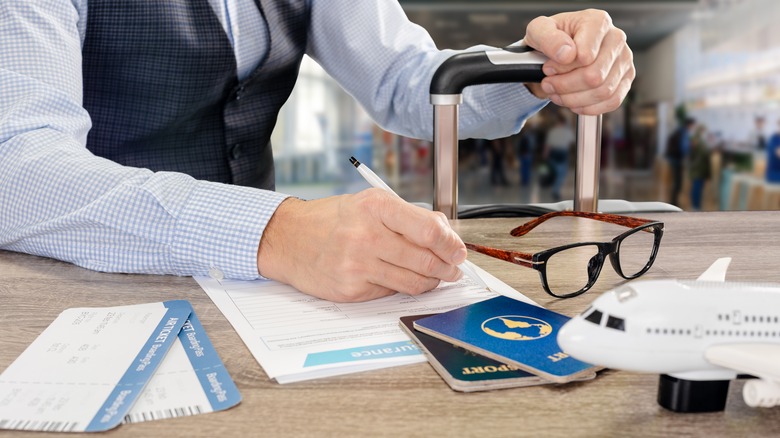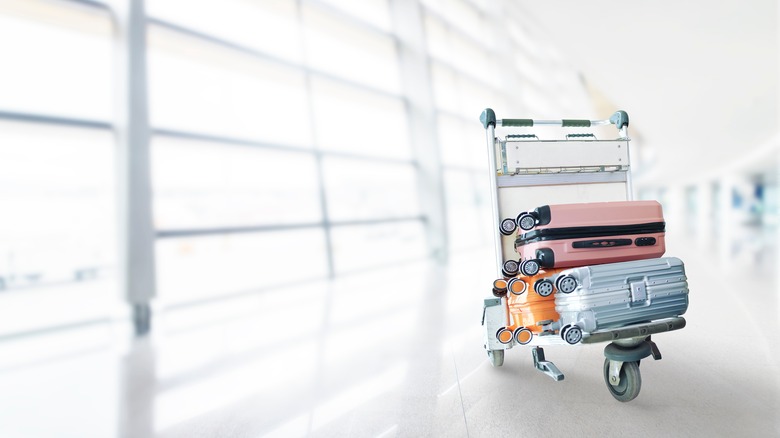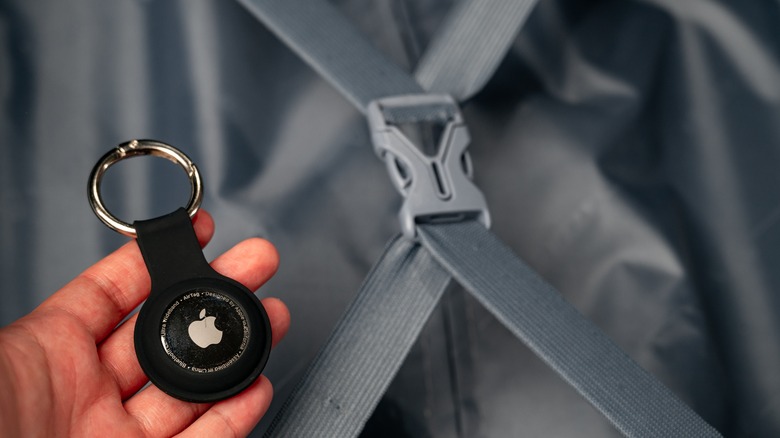What Do Airlines Owe You When They Lose Your Luggage?
Air travel is full of uncertainties and anxieties. Will your flight take off on time, or at all? Will that scary chime ding mid-flight to signal an emergency? And, once you've landed, the suspense continues at the baggage carousel, where you worry whether or not your luggage made it to your destination. After shelling out those pesky airline baggage fees, you naturally expect to reunite with your suitcase. But the truth of the matter is that bags do get lost. According to the U.S. Department of Transportation (DoT) Air Travel Consumer Report, less than 1% of the nearly 37.5 million checked bags were mishandled in January 2024, which sounds reassuring until you're part of the unlucky 1%.
But all is not lost — literally. In the event that you lose your baggage along the way, do know that the law is on your side. Airlines are legally required to provide compensation for the hassle brought about by delayed and lost baggage. In fact, the DoT penalizes airlines that fail to properly compensate passengers for bags lost under their watch. "All air passengers, regardless of whether they are taking domestic or international flights, deserve to be compensated fairly for lost, damaged or delayed baggage," former U.S. Transportation Secretary Ray LaHood said in a statement in 2019.
So, what do you do when your luggage goes AWOL? Here's a low down on what you're owed, the process of collecting reimbursements, and ways to avoid losing your baggage altogether.
You may get up to $3800, depending on the flight
Before anything else, it's important to note that each airline has its own timeline for when a bag officially gets declared "lost." Some airlines might consider luggage lost if not retrieved within five days, whereas others may wait up to 14 days. Regardless of the waiting period, what's consistent across the board is the potential payout you can expect if your bag unexpectedly disappears.
Interestingly, compensation may be higher for domestic flights than for international flights. The DoT notes that if your bags get lost on a domestic flight, you might see up to $3,800 in compensation, which is considered the "maximum liability amount." While airlines have the discretion to offer compensation beyond this limit, they are not legally obligated.
On the other hand, the rules are trickier for international flights, as they are largely guided by the Montreal Convention. Under this agreement, the lost luggage liability is capped at 1,288 Special Drawing Rights (SDR), a type of "international reserve asset" established by the International Monetary Fund. According to the DoT, 1,288 SDR translates to roughly $1,700. And much like their domestic counterparts, international carriers can choose to pad that figure, though they are not mandated to.
You may also be compensated for delayed luggage
Per the DoT, the same liability amounts apply for delayed luggage, but obviously, delayed baggage is not as severe as losing your luggage completely. Airlines, however, recognize that delayed baggage can still significantly disrupt your travel plans, so they have developed various policies — some more straightforward than others — to reimburse passengers for any necessary purchases made due to delayed belongings.
Delta Air Lines provides "reasonable expense reimbursements" for delayed luggage, allotting $50 per day for the first five days, which will then be deducted from the final compensation in the event that your bag eventually gets declared as lost. However, the company is clear that this amount is not by any means a ceiling limit. As a gesture of goodwill, Delta even provides a rebate for the checked baggage fee via online credit.
Meanwhile, JetBlue encourages its passengers to "purchase any essential and reasonable items" they may need during the delay. Passengers can then submit a claim online along with their receipts to be reimbursed for these expenses. United employs a similar policy, and so does American Airlines. Alaska Airlines also offers coverage for "travel essentials" purchased, but requires claims to be submitted in person.
What to do if your luggage is lost
If your luggage fails to arrive at your destination and is subsequently declared lost, it's crucial to follow specific steps for compensation. Airlines, including major carriers like Southwest, American Airlines, Delta, United, and JetBlue, typically require passengers to file a claim through their designated portals. Each claim process necessitates a reference number, generally found on your baggage tag, to help track your lost items.
When filling out a form, the more detailed the better. For example, American Airlines requests information about the specific make and model of your lost luggage, as well as any distinct features it might have. United Airlines' process, on the other hand, involves listing the contents of your bag. This is where a detailed inventory of your belongings and a photo of your luggage comes in handy. It would even help if you had receipts of your items, especially for the high-ticket ones, so you have better chances of getting reimbursed properly.
It's also important to note that reimbursement claims take time, and may take weeks before they are processed. However, should you find that the airline is stalling, you can lodge a complaint to the DoT. "They've got a special aviation enforcement office where they're being much more proactive about protecting consumers and trying to clamp down on airlines when they're not providing customers with the type of compensation or reimbursement that they're required to do under federal laws," travel expert Scott Keyes told CNN.
Compensation from credit card company and travel insurance
While airlines might be your first stop for compensation, they're not your only recourse. Your credit card or travel insurance can also come to the rescue, both ensuring that you get the compensation you deserve.
Travel insurance, often dismissed as an unnecessary expense, can prove invaluable when you hit a snag like losing your baggage. "Maybe you lose your backpack or your train ticket, or your passport gets wet, you get pickpocketed and lose your wallet, or your phone gets lost or stolen," insurance company spokesperson Lisa Cheng told Forbes. "Travel insurance can support you in either getting replacements or reimbursements for these things, provided that you've taken reasonable care of them." These policies typically cover up to $3,000, proving that sometimes, the extra expense is worth it.
Then there's your trusty credit card. Given that you booked your flight with it, you might have a built-in safety blanket for lost bags. Many credit cards also offer up to $3,000 per passenger for lost luggage. In fact, you may not even have to apply for a new card for this type of coverage, as one may already be sitting in your wallet. "If you have a card that's travel-focused, there's a good chance you may have travel protection benefits and not even realize it," Stella Shon, a credit card expert, told The Washington Post. "Every cardholder has a benefits guide online from their issuer, so a first step is to check there."
Is there a way to avoid losing my luggage?
You can't magically will your luggage to be where you want it, but there are ways to minimize your chances of losing it. For starters, skip out on checking in baggage completely. Packing everything you need into a single carry-on can save you a lot of headaches. You may also want to steer clear of airports notorious for losing luggage for added peace of mind. Spoiler alert: in the U.S., it's New York City's John F. Kennedy International Airport (JFK). It would also be best if you removed existing baggage stickers on your suitcase, lest you want it to get misrouted in the complex network of airport baggage logistics.
In cases where your airline doesn't offer its own luggage tracking, consider using a personal tracker like an Apple AirTag or a Tile. These tools, which sync with your smartphone, allow you to monitor your bag's whereabouts in real-time, provided you have internet access. "It's best to put the device in a pocket or pouch that is easily accessible and out of sight," tech expert Michael Xavier advised to The Washington Post. "You'll want to make sure that the device is securely attached to the bag, as it could become dislodged during transit." While you're at it, ensure your luggage stands out to reduce the risk of it being mistakenly taken by another traveler. You can do this by either choosing a brightly colored bag or using a vibrant luggage cover.




